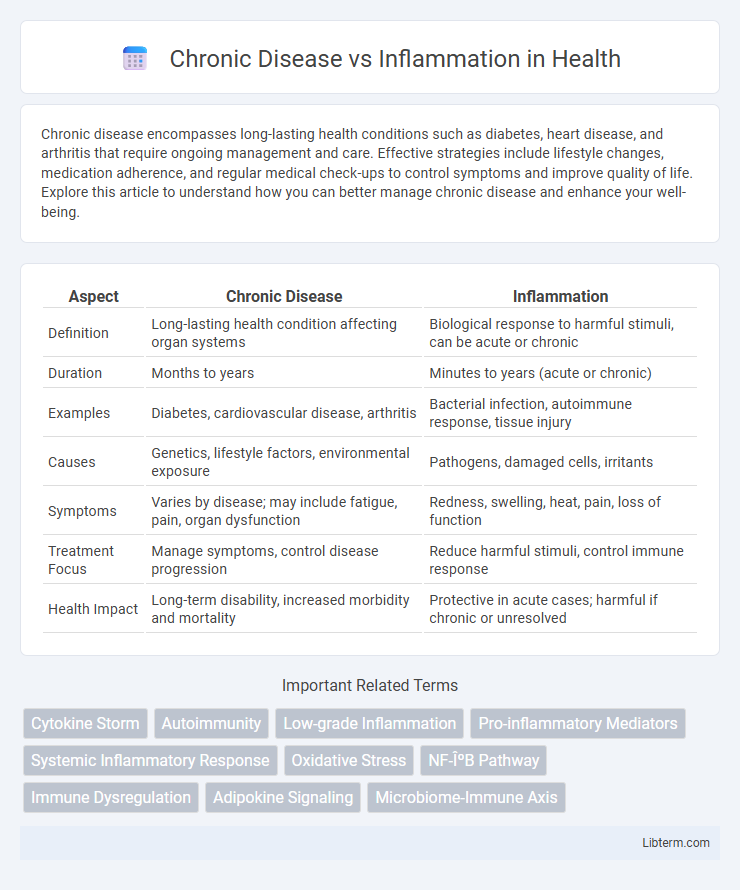Chronic disease encompasses long-lasting health conditions such as diabetes, heart disease, and arthritis that require ongoing management and care. Effective strategies include lifestyle changes, medication adherence, and regular medical check-ups to control symptoms and improve quality of life. Explore this article to understand how you can better manage chronic disease and enhance your well-being.
Table of Comparison
| Aspect | Chronic Disease | Inflammation |
|---|---|---|
| Definition | Long-lasting health condition affecting organ systems | Biological response to harmful stimuli, can be acute or chronic |
| Duration | Months to years | Minutes to years (acute or chronic) |
| Examples | Diabetes, cardiovascular disease, arthritis | Bacterial infection, autoimmune response, tissue injury |
| Causes | Genetics, lifestyle factors, environmental exposure | Pathogens, damaged cells, irritants |
| Symptoms | Varies by disease; may include fatigue, pain, organ dysfunction | Redness, swelling, heat, pain, loss of function |
| Treatment Focus | Manage symptoms, control disease progression | Reduce harmful stimuli, control immune response |
| Health Impact | Long-term disability, increased morbidity and mortality | Protective in acute cases; harmful if chronic or unresolved |
Understanding Chronic Disease: An Overview
Chronic disease often results from prolonged inflammation, which disrupts normal cellular function and causes tissue damage over time. Persistent inflammatory responses contribute to conditions such as cardiovascular disease, diabetes, and autoimmune disorders by promoting oxidative stress and immune system dysregulation. Understanding the mechanisms of chronic inflammation is crucial for developing targeted treatments that reduce disease progression and improve patient outcomes.
Defining Inflammation and Its Types
Inflammation is the body's immune response to injury or infection, characterized by redness, swelling, heat, and pain. It is classified into two main types: acute inflammation, which is a short-term, protective reaction to harmful stimuli, and chronic inflammation, a prolonged and maladaptive response that can contribute to the development of chronic diseases such as arthritis, cardiovascular disease, and diabetes. Understanding the distinction between acute and chronic inflammation is crucial for targeting treatments that mitigate long-term tissue damage and disease progression.
Relationship Between Chronic Disease and Inflammation
Chronic diseases such as diabetes, cardiovascular disease, and arthritis are closely linked to persistent inflammation, which acts as both a cause and consequence of these conditions. Inflammatory markers like C-reactive protein (CRP) and cytokines are consistently elevated in patients with chronic disease, indicating ongoing immune system activation. Understanding the bidirectional relationship between chronic inflammation and disease progression is crucial for developing targeted therapies to reduce long-term complications.
Common Chronic Diseases Linked to Inflammation
Chronic inflammation is a key underlying factor in common chronic diseases such as rheumatoid arthritis, type 2 diabetes, cardiovascular disease, and inflammatory bowel disease. Persistent inflammatory responses disrupt tissue function, leading to progressive damage and disease exacerbation. Monitoring inflammatory biomarkers like C-reactive protein (CRP) can aid in early detection and management of these inflammation-related chronic conditions.
Acute vs. Chronic Inflammatory Responses
Acute inflammatory responses are rapid, short-term reactions aimed at eliminating pathogens and initiating tissue repair, characterized by redness, heat, swelling, and pain. Chronic inflammation results from prolonged immune activation, often due to persistent infections or autoimmune disorders, leading to tissue damage and contributing to chronic diseases such as arthritis, cardiovascular disease, and diabetes. Understanding the transition from acute to chronic inflammation is critical for developing targeted therapies to manage and prevent long-term inflammatory-related conditions.
Key Biological Pathways Involved
Chronic diseases often result from persistent inflammation mediated by key biological pathways such as the NF-kB signaling, which promotes the transcription of pro-inflammatory cytokines like TNF-a and IL-6. The NLRP3 inflammasome pathway plays a crucial role in activating caspase-1, leading to the maturation of IL-1b and IL-18, further driving chronic inflammation. Dysregulation in these pathways contributes to tissue damage and the progression of diseases including rheumatoid arthritis, cardiovascular disease, and type 2 diabetes.
Risk Factors Influencing Both Conditions
Chronic diseases such as cardiovascular disease, diabetes, and arthritis share common risk factors with inflammation, including obesity, smoking, poor diet, and sedentary lifestyle. These risk factors contribute to persistent low-grade inflammation, which exacerbates tissue damage and progression of chronic conditions. Genetic predisposition and environmental exposures further modulate the inflammatory response, increasing susceptibility to chronic disease development and severity.
Diagnosis: Identifying Chronic Inflammation
Diagnosing chronic inflammation involves measuring biomarkers such as C-reactive protein (CRP), erythrocyte sedimentation rate (ESR), and cytokine levels like interleukin-6 (IL-6). Advanced imaging techniques, including MRI and PET scans, help detect inflammation in tissues and organs linked to chronic diseases. Accurate identification of persistent inflammatory responses is critical for targeting underlying causes and managing conditions like rheumatoid arthritis, cardiovascular disease, and type 2 diabetes.
Strategies for Managing Inflammation in Chronic Disease
Effective management of inflammation in chronic disease involves adopting anti-inflammatory diets rich in omega-3 fatty acids, antioxidants, and fiber to reduce systemic inflammation. Regular physical activity and stress reduction techniques such as mindfulness and yoga play a critical role in modulating the immune response and decreasing inflammatory markers like C-reactive protein (CRP). Pharmacological treatments including NSAIDs and disease-modifying antirheumatic drugs (DMARDs) are often prescribed to control inflammation and prevent tissue damage in conditions such as rheumatoid arthritis and inflammatory bowel disease.
Prevention and Lifestyle Modifications
Chronic diseases such as diabetes, heart disease, and arthritis are often driven by persistent inflammation, which can be alleviated through targeted lifestyle modifications. Incorporating an anti-inflammatory diet rich in fruits, vegetables, whole grains, and omega-3 fatty acids significantly reduces systemic inflammation and lowers disease risk. Regular physical activity, stress management, and smoking cessation further optimize immune function and prevent the onset or progression of inflammation-related chronic illnesses.
Chronic Disease Infographic

 libterm.com
libterm.com